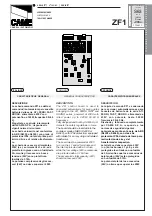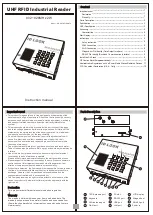
ii
T
ABLE OF
C
ONTENTS
1
I
NTRODUCTION
............................................................................................................................................................. 1
1.1
Scope of the Manual ..................................................................................................................................... 1
1.2
Product Overview.......................................................................................................................................... 1
1.3
Part Numbers and List Options..................................................................................................................... 1
2
S
YSTEM
F
EATURES
, C
ONTROLS AND
D
ISPLAYS
............................................................................................................ 2
2.1
Shelf Features............................................................................................................................................... 2
2.2
RSM 48/10 Power Module Features............................................................................................................. 3
2.3
Supervisory Module (Optional) ..................................................................................................................... 5
3
I
NSPECTION
.................................................................................................................................................................. 8
3.1
Packing Materials.......................................................................................................................................... 8
3.2
Check for Damage ........................................................................................................................................ 8
4
I
NSTALLATION
.............................................................................................................................................................. 9
4.1
Safety Precautions ........................................................................................................................................ 9
4.2
Tools Required.............................................................................................................................................. 9
4.3
Shelf Preparation/Mounting .......................................................................................................................... 9
5
M
ODULE
I
NSERTION
/R
EMOVAL
................................................................................................................................... 10
5.1
Removal ...................................................................................................................................................... 10
5.2
Installation ................................................................................................................................................... 10
6
S
HELF
G
ROUNDING
, W
IRING AND
C
ONNECTIONS
......................................................................................................... 11
6.1
Safety Precautions ...................................................................................................................................... 11
6.2
AC Feeder Protection.................................................................................................................................. 11
6.3
AC Input Connections ................................................................................................................................. 11
6.4
Grounding ................................................................................................................................................... 11
6.5
DC Output Connections .............................................................................................................................. 11
6.6
Alarm and Control Connections/Configuration ........................................................................................... 11
6.7
Temperature Compensation Connections/Configuration............................................................................ 12
7
I
NITIAL
S
TART
-
UP
....................................................................................................................................................... 13
8
O
PERATION AND
A
DJUSTMENTS
................................................................................................................................. 14
8.1
Start-up ....................................................................................................................................................... 14
8.2
Shutdown .................................................................................................................................................... 14
8.3
Adjustments ................................................................................................................................................ 14
9
M
AINTENANCE
........................................................................................................................................................... 19
9.1
Fuse Replacement ...................................................................................................................................... 19
10
A
RGUS
C
ONVENTIONS
................................................................................................................................................ 20
10.1
Numbering System...................................................................................................................................... 20
10.2
Acronyms and Definitions ........................................................................................................................... 20
Summary of Contents for RSM 48/10
Page 1: ...RSM 48 10 Top Input Output 19 Shelf for 30A System 030 692 B2 ...
Page 8: ...This page intentionally left blank ...
Page 33: ......
Page 34: ......
Page 37: ......











































